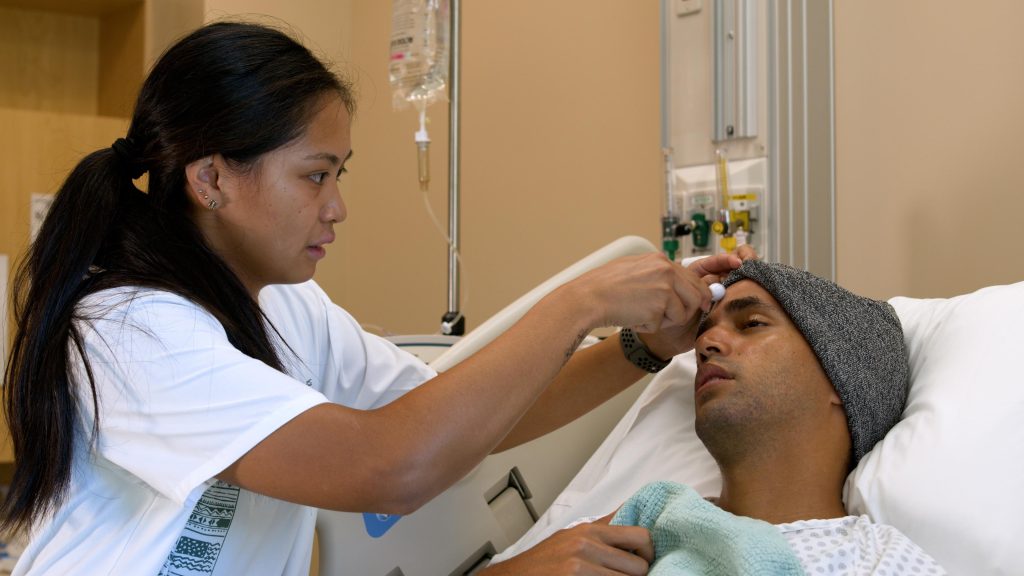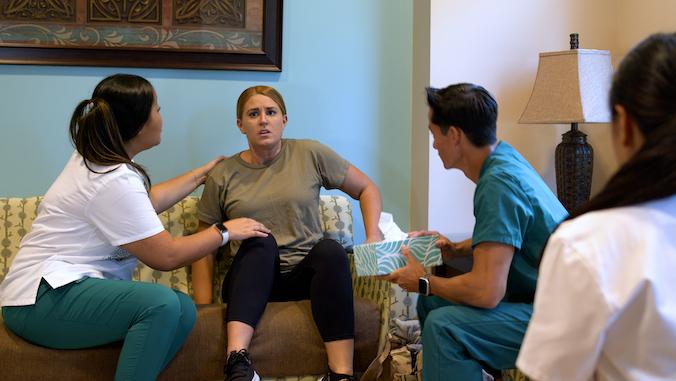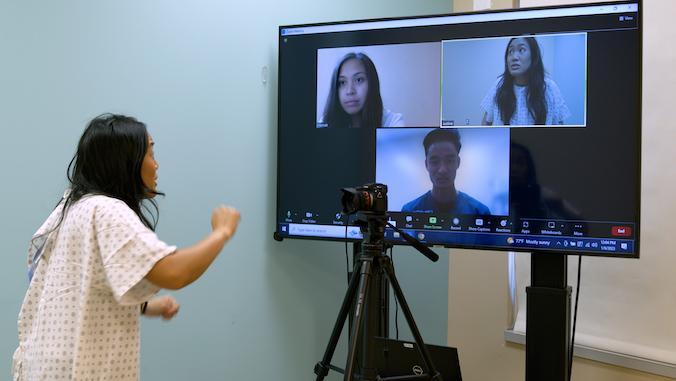University of Hawaiʻi uses acting students to simulate patients for nursing school

Kalā Müller, a student at the University of Hawaiʻi at Mānoa’s Department of Theatre and Dance, regularly plays an 80-year-old with tuberculosis.
But he is not honing her acting skills at a theater or movie set. He’s playing the part at the university’s Nancy Atmospera-Walch School of Nursing.
“It’s just a really good exercise for me because I get to play him in different ways,” Müller said. “Depending on the healthcare students’ responses, he can be really grumpy one day or he can be very sympathetic to the people who are trying to help him … It’s really stretching me as an actor.”
The innovative academic program is HealthCAST, which is celebrating 10 years of strategically bringing acting and nursing students together so both can improve their skills outside the classroom.
HealthCAST stands for Health Collaborative Acting Simulation Training. Over the past decade, more than 100 theatre and dance students have sharpened their acting skills portraying patients and their families. At the same time, hundreds of nursing students have been able to practice patient interactions they have learned in the classroom and in clinicals during real-life scenarios.

At the end of each simulation, actors and healthcare students provide feedback on each other’s performances, ensuring that everyone has an opportunity to grow in their respective disciplines.
HealthCAST supports more than two dozen simulation scenarios across the undergraduate and graduate nursing curricula, as well as several interprofessional simulations that may include students from medicine, social work, spiritual care, dietetics, athletic training, education and pharmacy.
In spring 2023, HealthCAST will support the education of more than 200 nursing students and nearly 200 interprofessional students.
The collaboration thrives and continues to innovate and deepen the relationship between the sciences and the arts in its pursuit to provide transformative educational experiences,” said Lorrie Wong, the nursing school’s interim associate dean for academic affairs and director of the UH Translational Health Science Simulation Center.
Wong was one of HealthCAST’s originators who helped bring the program to fruition.
“I would say for us, just that sense of collaboration and being able to put our skills into use with a real human and not necessarily a machine all the time,” undergraduate nursing student JT Kim said. “It’s amazing.”
These simulation scenarios take place at the nursing school’s UH Translational Health Science Simulation Center, a state-of-the-art simulation center that mirrors equipment and practices currently used by the state’s leading medical centers.
The center provides a location where students, practicing providers and the entire health care team can gain experience and skills they need to provide safe, quality patient care.
In 2013, the program started with two graduate assistants who served as actors. Today, the program now has five graduate assistants who divide time between teaching and performing with HealthCAST.
The program recently supported local and international simulation events, such as the COVID-19 Pandemic Contact Tracing Training.
“Our partnership has provided excellent additional training opportunities in psychological realism for our acting students,” said Markus Wessendorf, chair and professor of theatre and dance. “They must portray the kind of emotional depths found in more traditional theatre productions but without the nightly rehearsals and three-hour long performances that are required with plays and musicals.”
Current innovations include partnering with makeup students from the theatre department to enhance the realism for old age makeup and wound moulage (art of applying mock injuries). HealthCAST also partners with scenic and props students to enhance the realism of the immersive environments.

Wong and Alex Munro, program manager at HealthCAST, are excited about HealthCAST’s future plans to expand support of psych-mental health education especially for adolescent mental health, and support training using telehealth.
“We remain ready to support new innovations and trends coming up in healthcare,” Wong said. “Our opportunities to work with other departments within the university need to continue to be explored because the benefits we’ve had through this collaboration have been priceless.”



